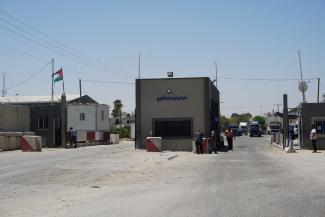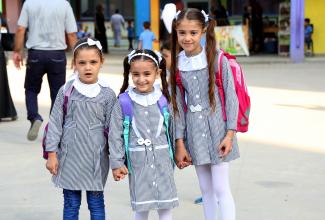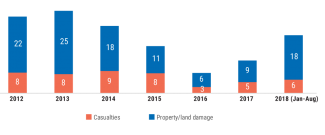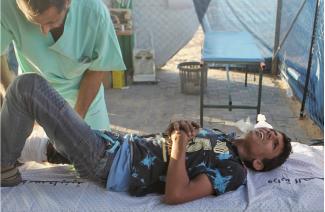Between 9 July and 15 August, the Israeli authorities severely tightened restrictions on the movement of goods through the Kerem Shalom crossing between Gaza and Israel, and further reduced the area permitted for fishing at sea from six/nine to three nautical miles. According to the Israeli authorities, these measures were in response to the launching of incendiary kites and balloons from Gaza into Israel that have resulted in extensive property damage. In May, over the course of the demonstrations, the crossing was set on fire and damaged twice by demonstrators, and closed for a few days on each occasion.
The Monthly Humanitarian Bulletin | August 2018
Israeli authorities lift recent restrictions on Kerem Shalom but additional restrictions imposed at Erez Crossing. UN emergency fuel programme for essential health and WASH services in Gaza about to run out. Pest that infects olive trees expected to significantly reduce this year’s harvest in West Bank
In this document
This month’s Bulletin is again devoted to the deteriorating humanitarian situation in Gaza, except for one article dealing with the upcoming olive harvest in the West Bank. Between 9 July and 15 August, the Israeli authorities tightened the blockade on Gaza, severely restricting the movement of goods through the Kerem Shalom crossing between Gaza and Israel, and reducing the permissible fishing area by sea to three nautical miles. According to the Israeli authorities, the tightened restrictions were adopted in response to security incidents along the fence and the launching of incendiary kites and balloons from Gaza, which have resulted in extensive property damage in Israel. Only food, medical supplies and animal fodder were allowed to enter into Gaza, while the exit of goods was entirely banned. The restrictions further undermined the already devastated economy, which in the second quarter of 2018 recorded the highest unemployment rate ever recorded in the Gaza Strip: 53.7 per cent.
The 2018 olive harvest season will last approximately from mid-September to mid-November. However, a pest that infects olive trees, particularly in the norther West Bank, is expected to significantly reduce this year’s yield compared with 2017 (see box). In recent years, the olive harvest has also been affected negatively by Israeli settlers stealing or damaging olive trees, and by restrictions on access by Palestinian farmers to olive groves behind the Barrier and near Israeli settlements.
Since 30 March 2018, Palestinian casualties in the Gaza Strip have increased significantly due to the mass demonstrations taking place along the perimeter fence with Israel and, to a lesser extent, hostilities and other incidents.













